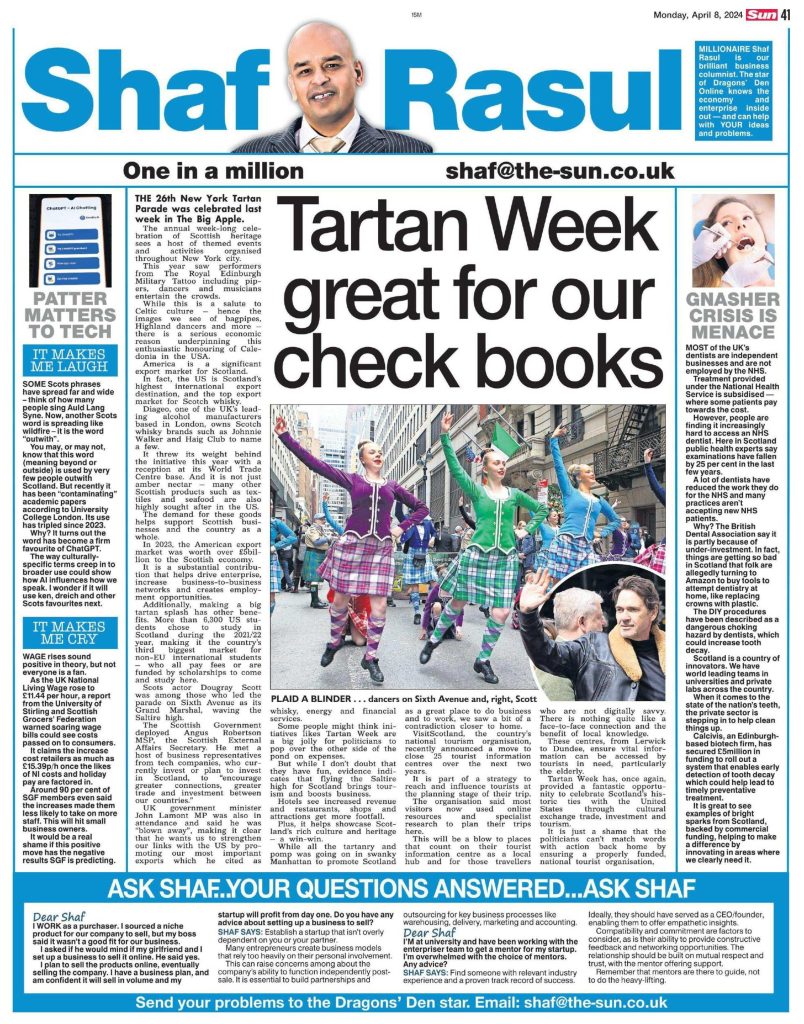The 26th New York Tartan Parade took place this month, marking another celebration of Scottish culture and heritage in The Big Apple. What many see as a joyful, tartan-filled week of music, dance and diplomacy also doubles as an important economic driver for Scotland.
This year’s festivities featured standout performances from The Royal Edinburgh Military Tattoo, while pipers and Highland dancers marched down Sixth Avenue. But behind the Saltire-waving lies a more strategic objective: strengthening economic ties between Scotland and the United States.
The US is Scotland’s top international export market, particularly for Scotch whisky, textiles, seafood and tech. In 2023 alone, the American export market was worth over £5 billion to Scotland’s economy – a massive contribution that supports jobs and enterprise.
Diageo, one of the UK’s biggest drinks companies, got involved again this year, hosting a reception at its World Trade Center base to showcase its Scotch brands like Johnnie Walker and Haig Club.
And it’s not just whisky. More than 6,300 US students studied in Scotland in 2021/22 – our third largest non-EU market for international students. They not only contribute tuition fees, but also inject energy, culture and spend into our communities.
Actor Dougray Scott led this year’s parade as Grand Marshal, while Angus Robertson MSP met US tech firms keen to invest in Scotland. UK minister John Lamont MP also praised the strong economic case for promoting whisky, energy and financial services in the States.
Critics might dismiss this as a political jolly – but the data doesn’t lie. Events like Tartan Week build trade, raise Scotland’s global profile, boost tourism and spark investment. Restaurants, hotels and attractions benefit, and the cultural prestige doesn’t hurt either.
Yet while politicians schmoozed in Manhattan, a contradiction unfolded back home.
VisitScotland announced plans to close 25 tourist information centres, including key hubs in Lerwick, Dundee and Fort William. The justification? Tourists now plan online. But for many – particularly older travellers – face-to-face guidance and local insight are irreplaceable.
In cutting physical tourism hubs, we risk eroding the visitor experience just as we’re working hard to sell Scotland abroad. If the goal is to increase international and domestic tourism, surely that requires a properly funded infrastructure to welcome people once they arrive?
Tartan Week proves that Scotland can punch above its weight globally. But we also need to invest in the basics at home – like keeping tourist centres open, maintaining accessible transport links, and promoting all corners of our country.
Because what’s the point in convincing the world to visit Scotland, if we’re slowly dismantling the welcome mat?
NHS dentistry crisis sparks DIY danger
Most UK dentists are independent businesses. NHS treatments are subsidised, but not fully covered – and it’s becoming harder for Scots to find a dentist taking on new NHS patients.
Public health experts warn that dental exams are down 25 per cent, and the British Dental Association blames under-investment. Many dentists have scaled back NHS work or stopped it altogether.
The crisis is so bad, reports say some people are turning to Amazon to buy DIY dentistry tools – including kits to fit plastic crowns at home. Dentists warn these carry choking risks and can worsen decay.
But where the public sector falls short, private innovation steps up.
Edinburgh biotech firm Calcivis just secured £5 million to roll out a system for early detection of tooth decay, allowing better preventative care. A great example of Scottish innovation tackling public health challenges.
It Made Me Laugh
‘Outwith’ goes viral – thanks to AI
Scots words have been known to travel – think of “Auld Lang Syne” echoing around the globe. But now a lesser-known favourite is going international: “outwith.”
Meaning “outside” or “beyond,” it’s mostly used in Scotland. But according to University College London, it’s started “contaminating” academic papers, with usage tripling since 2023.
The culprit? ChatGPT.
Turns out, this chatbot has a soft spot for Scots lingo. It may be the start of a linguistic revolution – who knows, “dreich,” “ken,” and “braw” might be next in the AI lexicon.
A reminder that our unique culture can influence the digital world too – whether we mean it to or not!
It Made Me Weep
Wage rise brings unintended consequences
The UK National Living Wage rose to £11.44/hour this month, which should be good news. But a new report from Stirling University and the Scottish Grocers’ Federation suggests small businesses may struggle to cope.
Once you add NI contributions, pension and holiday pay, the true hourly cost could rise to £15.39/hour.
A staggering 90 per cent of small grocers say it will make them less likely to hire staff.
While supermarkets can absorb costs, independent shops might raise prices or reduce headcount – a troubling reality in an already fragile retail sector.
A fair wage is vital – but it must be accompanied by support for small businesses to keep local economies alive.


